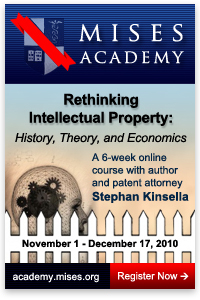Over this past summer I read William M. Johnston’s ‘The Austrian Mind‘. This scholarly work amply demonstrates Johnston’s vast erudition in the intellectual history of the Austrian-Hungarian empire during the Victorian era, or better yet, the Franz-Josephian era. I wanted to highlight a comparison that Johnston draws between the attitudes of that era’s medical establishments focus on diagnosis rather than treatment, with the classical liberal stance of non-intervention with market activities.
“The indifference to human life, which as late as 1900 afflicted the General Hospital, both contradicted and reinforced other Viennese attitudes… Disease comprised part of life: the task of doctors was not to eradicate it but merely to understand it. Refusal by nineteenth-century physicians to intervene in natural processes paralleled the reluctance of many Austrians to participate in politics. Likewise, the preference of Carl Menger and Ludwig von Mises for an unimpeded market seemed to corroborate the medical dictum, “The essential is to do no harm” (Primum est non nocere). -Pages 228-229
 The comparison is not entirely unfair, and certain qualities do correspond one another in a pleasing manner. For one, the quoted medical dictum is strikingly similar to Virgil’s oft-quoted aphorism “Tu ne cede malis sed contra audentior ito“, the motto by which Mises strived his life’s work.
The comparison is not entirely unfair, and certain qualities do correspond one another in a pleasing manner. For one, the quoted medical dictum is strikingly similar to Virgil’s oft-quoted aphorism “Tu ne cede malis sed contra audentior ito“, the motto by which Mises strived his life’s work.
‘Therapeutic nihilism’, as Johnston explained elsewhere, “[i]n medicine this phrase denoted systematic refusal to prescribe remedies for fear of perpetuating quack cures.” Later, he expounds on the unintentional side effect wrought by this passive attitude– “[i]t was a more cold-blooded self-mastery that impelled the Vienna anatomists to launch modern medicine. By sweeping away the post hoc, ergo propter hoc fallacies that had vitiated earlier therapy, they enabled the next generation to implement empirical pharmacology.”
It is eminently reasonable to compare this cold, medical attitude to the laissez-faire position that identified the policies of an interventionist state to be “quack cures”. Instead, the body politic would stop impeding the system’s endogenous recovery by simply refraining from coercive, property-invading measures, and thus allowing the market to work things out.
From the context I’m not entirely clear of Johnston’s intentions, and whether his distaste of the hands-off medical ethos carried over into the socio-political side of the analogy and so to be charitable I won’t presume this to be the case. Yet, someone less forgiving than I can read from these passages an insinuation that relying on the market’s “natural processes” is insufficient [i.e., the market is not perfectly self-regulating], and that it is therefore ripe for a dose of ’empirical pharmacology’ to improve things.
Now, unlike a doctor, an economist is a practitioner of a wertfrei science and as such would be overstepping the boundaries of his discipline if he were to proclaim a market to be “imperfect” or “inefficient”. Perfect/imperfect implies a comparison to some other situation, and whether or not that situation is to be preferred is strictly a matter of a subjective value judgment.
Yet, even if one were to concede the point that markets are sometimes flawed, this still would not support the notion that a central planner could or would be able to do a better job of making the market more perfect. If anything, Mises’s famous calculation argument showed that this would be an impossible task.
In conclusion, there is no reason to think that modern empirical economics is anything other than the same old quack medicine with a veneer of respectability.
 My article, Rethinking Intellectual Property: History, Theory, and Economics, was published today (Oct, 22, 2010) on Mises Daily. It details the content and purpose of my upcoming Mises Academy course, “Rethinking Intellectual Property: History, Theory, and Economics,” Mises Academy (Nov.-Dec. 2011) (discussed on the Mises Blog in Study with Kinsella Online). Sign up!
My article, Rethinking Intellectual Property: History, Theory, and Economics, was published today (Oct, 22, 2010) on Mises Daily. It details the content and purpose of my upcoming Mises Academy course, “Rethinking Intellectual Property: History, Theory, and Economics,” Mises Academy (Nov.-Dec. 2011) (discussed on the Mises Blog in Study with Kinsella Online). Sign up!

 The comparison is not entirely unfair, and certain qualities do correspond one another in a pleasing manner. For one, the quoted medical dictum is strikingly similar to Virgil’s oft-quoted aphorism “Tu ne cede malis sed contra audentior ito“, the motto by which Mises strived his life’s work.
The comparison is not entirely unfair, and certain qualities do correspond one another in a pleasing manner. For one, the quoted medical dictum is strikingly similar to Virgil’s oft-quoted aphorism “Tu ne cede malis sed contra audentior ito“, the motto by which Mises strived his life’s work.